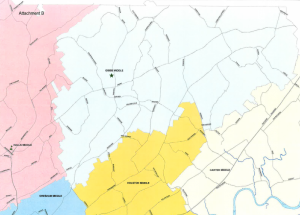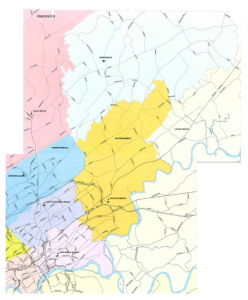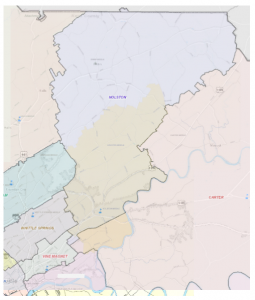The preliminary rezoning proposal has been drafted for our new middle schools. After a period for community input, the final proposal is expected to be presented to the Board of Education in May.
A link to the full draft is available at the bottom of this summary from the Knox County Schools Website:
 Top Half: Gibbs and Holston Zones  Bottom Half: Gresham, Holston, Whittle Springs, Vine, and Carter  Full Gibbs and Holston Zones  New Zones with Previous Zone Overlay
The Knox County Board of Education works for the passage of new laws designed to advance the cause of improving education and for the repeal or modification of existing laws and the defeat of proposed laws that impede this cause. The Board’s current Legislative Priorities list and other information can be found here: https://www.knoxschools.org/board
KCBOE Legislative Priorities 2017 with adopted language
The following information is from the Knox County Schools website. Please access all official documents here:
Knox County Schools Superintendent Application
The Board of Education is seeking an experienced, discerning leader for the position of Superintendent. Located in Knoxville, Tenn., Knox County Schools serves approximately 60,000 students in 89 schools and was recently named an Exemplary District by the Tennessee Department of Education. The ideal candidate should have a proven passion for public education, excellent communication skills and success in managing a large organization and budget.
Candidates should have the following prerequisites:
- Meet all requirements as set forth by the State of Tennessee for a Director of Schools.
- Possess a current valid professional educator license.
- Hold a Master’s degree in Education.
- Have public education teaching experience.
- Have experience in administration and/or a senior leadership role within a school system.
Please complete the entire application – even if it duplicates information found on your resume. Save the completed application to your computer using the following file name format – Last name First name Date.
KCSInformationalBrochure
KCSSuperintendentJobDescription
There is quite a lot of misinformation being spread about potential rezoning in Knox County Schools. Please look at the actual information being sent out from Knox County Schools, rather than listening to rumors.
The new middle schools are set to open in August 2018. (Almost 2 years)
There is currently NO PLAN in place for rezoning. Meetings are being conducted to get feedback from parents BEFORE creating new zones.
Once input has been gathered from all of these meetings, it will be used to begin creating a plan, which is expected to be ready in February. That plan will be presented to the community for additional feedback before being finalized.
The slides from the recent meeting at Gibbs Elementary are available here:
Gibbs Meeting Slides
Additional information is available here:
Rezoning Information
If you have questions, please email me: jennifer.owen@knoxschools.org
The Department of Research and Accountability has a calendar of county-wide testing available here:
http://knoxschools.org/Page/2056
Other assessment information can also be found on the KCS Accountability webpage:
http://knoxschools.org/site/Default.aspx?PageID=4351
I implore you to learn about policy changes that took place during the previous administration and ask your school board members to return responsibility for managing KCS to the BOE. It is their DUTY under the law. Delegating this responsibility to one person is reckless and irresponsible.
For years, people have asked how/why the KCS superintendent had so much unchecked power.
They asked why nobody could do anything about it.
The answer is pretty simple:
A Board sets policy and their policies empowered him.
The argument between managing or micro-managing is pointless.
These policies determine whether the supervisor manages the employee or the employee manages the supervisor. If the employee isn’t willing to be managed and/or if the supervisor isn’t willing to manage, it is time for a change.
A Board governs through policy.
Waiting until AFTER something happens is an extremely poor way to govern. By that same token, creating a policy that delegates authority away from those who have a duty to manage closes the door on oversight and transparency. those who have a duty to manage closes the door on oversight and transparency.
For the past three months, I have been trying to help others understand the seriousness of some of the policy changes that took place under the previous administration. The interim superintendent has railed against anything that limits his unchecked power and continues making unprecedented changes to positions as well as to the entire administrative reporting structure. The current Board seems to have a serious lack of concern for doing their job and correcting this situation.
Policy change introduction, presented to the BOE at the December 5th work session:
These four policies were changed during the previous administration. At that time, we had a superintendent with a management style that was very top-heavy – and some have gone so far as to call it “dictatorial.” Yes, there was “a reason” these policies were changed:
- These changes made it easier for mis-management to work, unencumbered by questions or transparency.
- These changes delegated away the Board’s legal duty to “manage and control all public schools established or that may be established under its jurisdiction” (T.C.A. 49-2-203)
- Related to the duty to manage, there was an opinion expressed in the Supreme Court of TN, which (though not always embraced) has remained legally true for nearly 40 years:
“The duties of the superintendent are highly important but they do not, with respect to essential features of school management, override the authority of the school board. Naturally, the superintendent’s advice will be given much consideration, but the ultimate responsibility and the finality as to choice rests with the school board.”
This quote continues with the following (which was not read in the Dec. 5th meeting):
“It may act on its own sound judgement as to what is required by the public welfare, and contrary to advice from any source, even from the superintendent of schools. The school board is still the master and not the servant. 201 Tenn. 190-191, 297 S.W.2d 640” (All from 558 S.W.2d 838 (1977), Sanders vs Vinson, et al. December 5, 1977)
That we are STILL having this problem – almost 40 years later – should be alarming.
Policy A-100
School District – School Board Legal Status and Authority.
This policy was revised 7/16, as the Board’s 5-4 voting bloc was running out of time in office.
3885_A-100 School District-School Board Legal Status and Authority Second Reading Revisions
(This is the red-lined version.)
My focus was to make this simple: just revert to the previous policy.
It would be a simple matter of replacing the one line that had been removed and renumbering:
“2 Approve the number of positions of employment & salary schedule for such positions”
Easy, right?
No.
It seems the misuse of semicolons is/was of no consequence to anyone, with the exception of the one between item #1 and #2. A Board member said it looks like #2 refers to #1, yet when I asked what they would like to see to make it clear. I got nothing constructive.
It would have been very easy to make a friendly amendment to move #2 to the top of the list, add the word “system-wide,” or just change all of the semi-colons to periods. Though several took issue with the language, nobody presented any amendment to make it more agreeable to them. Instead, the policy passed on first reading.
A full month later, Terry Hill stated in the work session that she still has a problem with the language and wants to invoke “personal privilege” to put off the second reading until January. She doesn’t want to DO anything to improve it – just put it off for 30 days…
PERSONAL PRIVILEGE
The reason this is significant is that this Personal Privilege ends all discussion and there can be nothing more said until the January meeting. The interim superintendent can continue creating, changing, or terminating positions however he likes. He may set the salary for those positions to be whatever he likes and create any job description and reporting structure he likes, as long as it can be funded within the present budget. In other words, if he wants to terminate 47 employees and create 5 brand new positions that report to the supervisor of underwater basket weaving, he can – as long as he does so within budgeted cost of those 47 terminated employees.
He (or the next super) can absolutely do that – and anything else you might imagine. And your elected Board won’t be able to do a darn thing about it (unless we begin another expensive termination process), because we GAVE him that power.
Crazy? Yep.
And that is how we have been operating for the past several years.
Unchecked.
Unencumbered.
Unhinged.
And this is only the beginning.
Please watch for part II.
(If you can’t wait for the continuation, links to the other three policies are at the bottom.)
SPOILER ALERT!
At the Board retreat in October, I presented a list of close to 30 policy revisions that I believe we need to consider as soon as possible. Of those, I will bring five to the October 31st work session and the November 2nd meeting.
It has become important to note that these policies are not about individuals, past or present, in any position. This is not an attempt to control who is in what position. That is not my job – and I don’t want that job.
This is simply an attempt to return to the Board, the ability to meet our responsibility to manage this LEA. This is not about hiring or firing people. This is about the Board and the public having a clear understanding of exactly what positions are created, how much those positions cost the taxpayers, how that impacts the budget, and giving the Board the ability to do the job we are tasked with doing.
There has been some discussion that these changes will not align with the interim superintendent’s contract and the “corporate model” he has agreed to work under. He has stated that he will not work under these conditions. Therefore, additional consideration may need to be given to whether to make adjustments there OR whether some of these should simply include a note that they will begin when the new superintendent is hired (or June 1).
POLICY A-100
Policy A-100 (Formerly ABB) was changed twice under the last administration. The first change, in March 2011, renumbered the policy as A-100 and removed the Board’s responsibility “to approve the number of positions of employment.” This left the 2011 version saying only that the Board would “approve salary schedules for positions.”
The policy was adjusted again in June and July of this year, as the administration was changing. That new language removed all mention of the Board approving positions and salaries for those positions. It now mentions ONLY approving salaries of teachers and leaves all other salaries and numbers of positions to the sole whim of the superintendent.
As good stewards of public tax dollars, I believe we need to correct this oversight as quickly as possible. Therefore, I will make the motion to accept our responsibility for managing the Knox County Schools by inserting the following language (from the 2008 policy) as number 2 under “DUTIES OF THE BOARD OF EDUCATION:”
Approve the number of positions of employment and salary schedule for such positions
[To begin June 1, 2017.]
This is the exact language from #2 under “Duties” in the 2008 policy manual, under ABB. This change will cause a renumbering of the duties which follow, but does not remove any language or authority.
POLICY B-140
- Board policy B-111 lists the Director of Schools (aka: superintendent) as an executive officer of the Board with both a secretarial and advisory duties.
- B-140 causes that executive officer to serve as a member of the executive committee, along with the Chair of the Board of Education.
- Policy B-162 requires the executive committee to deliberate by giving it responsibility for “developing an agenda for each Board meeting,”
- The Open Meetings Act requires all committees that report to the Board, are subcommittees of the Board, or make recommendations to the Board, to have meetings noticed (sunshined).
- The Executive Board has been thought to have an ability to make “emergency” decisions on behalf of the Board. This is not a legal function of the executive committee, nor is that function in policy.
- Since the superintendent, serves as an ex officio member of this body, it is important that we make clear whether the actions of the executive committee may be deliberative or not.
Ex officio:
because of your job, office, or position;
by virtue or because of an office;
adj. to describe someone who has a right because of an office held, such as being allowed to sit on a committee because one is president of the corporation.
In the interests of transparent government, if those meetings are not open, no deliberation should occur and no decision-making should take place. If the meetings are to serve any function that will cause them to have any decision-making authority, those meetings should be
appropriately noticed to the public.
To help this policy and our executive committee meet the requirements of the Open Meetings Act (TCA 8-44-102(b) ), I will make the following motion:
Any meeting of the executive committee, which may involve deliberation, decision-making, and or recommendations to the board, shall be open to the public and shall require public notice at least 48 hours prior to the meeting.
Current board members shall be allowed to observe meetings of the executive committee at any time, whether the meeting is open to the public or closed. Board members who attend as observers may not comment, discuss, or deliberate with the committee and their attendance will not require additional public notice.
POLICY C-110 – Lines of Authority and Staff Relations
In 2011, the Board relinquished responsibility for approving lines of authority and organization within the school district, handing that responsibility entirely to the superintendent by changing the first two lines of the policy.
The first two lines of the 2008 policy:
“The Director of Schools shall establish lines of authority which shall be approved by the Board and communicated to employees.”
The first two lines of the 2011 policy:
“The Board authorizes the Director of Schools to establish efficient organizational lines of authority and staff relations which shall be communicated to employees.”
Our current inability to create a full organizational chart for the district is indicative of the problems caused when lines of authority are unclear or constantly changing. In the interest of transparent government and accepting our fiduciary responsibility as the elected Board of Education, it is urgent that we revert the first two lines of policy C-110 to the language used in the 2008 policy. Therefore, I make a motion that we remove the first two lines of the current policy, C-110 and replace them with the following:
“The Director of Schools shall establish lines of authority which shall be approved by the Board and communicated to employees.”
POLICY C-132
2008 LANGUAGE:
“All administrative and supervisory positions in the school system are established initially by the Board, by state law, or State Board Rules, Regulations, and Minimum Standards. In each case, the Board will approve the broad purpose and function of the position in accord with state laws and state regulations, approve a statement of duties as recommended by the Director of Schools, and delegate to the Director of Schools the task of writing, or causing to be written, a job description for the position.
LANGUAGE CHANGED IN 2011
“The Board authorizes the Director of Schools to establish administrative and supervisory positions in the school system as constrained by the Board approved budget, by state law, and State Board Rules, Regulations, and Minimum Standards. The Director of Schools will develop a written job description for each position established.”
This motion will bring the policy in line with current practices. The current policy states that the superintendent will write each job description. As that responsibility is normally delegated to department supervisors and/or the Human Resources department, the policy should be changed to reflect that.
Proposed motion:
To remove the current language:
“The Director of Schools will develop a written job description for each position established,”
and replace it with:
“The Board will approve the broad purpose and function of the position, as recommended by the Director of Schools, and delegate to the Director of Schools the task of writing, or causing to be written, a job description for the position.”
I believe this covers the function of the previous language, allows the director to delegate the responsibility, as needed, and still removes the superfluous duplication regarding following the rules, laws, etc.
FORMER POLICY CO
This policy has either been completely removed at some point or it was missed when the policies were renumbered. The motion will be to put this policy back in the manual, exactly as it was before:
The Director of Schools shall report monthly the names of newly employed personnel.
The Director of Schools shall make annual reports concerning conditions of efficiency and needs of the school system. Included in the reports shall be information regarding employment of instructional staff as follows:
- Number of applicants interviewed and the number employed;
- Procedures being used to ensure that the best applicants are being selected;
- Evidence that all non-tenured teachers were evaluated;
- Number of non-tenured teachers;
- Number of teachers non-renewed;
- Summary and explanation of how our school system is meeting the state and national requirement[s]
of the No Child Left Behind Act and other mandated accountability measures.
Board members shall be made aware of all reports prepared by the Director of Schools’ office for transmittal to the local legislative body, the State Department of Education, or any federal agency.
The words, “of the No Child Left Behind Act” can be removed and an s added at the end of requirements, to bring the policy in line with current and future federally named requirements.
Thank you to all who have contacted me regarding the resolution to limit the use of test score data for this school year. I believe the media may have created some confusion about the purpose of the resolution, as well as the test data that will be returned to us and I want to clear up some of that confusion.
- The resolution does not seek to remove the test or the data that will be returned from the test. Teachers and students WILL have test data to use however they may need it, whether or not the resolution is adopted.
- With or without this resolution, this test cannot be used to accurately measure student growth in comparison to past years, as it is not the same as any of the tests we have used previously.
- Since we have not yet used this test, we cannot say whether the items tested will match previous tests or our curriculum.
- Comparing scores on three completely different achievement tests cannot give accurate results.
- Data from the tests is expected to be delivered several months after the tests are given.
- We have been told to expect data to be delivered sometime in November, months after the tests have been given.
- Knox County Schools is still waiting on test data from last year’s tests and we have been told that it may not be available until the end of November
- Teachers who DID use last year’s test data as part of their scores have been unable to determine when they may expect to receive any compensation for those scores.
- If comparing scores on three completely different achievement tests is somehow useful to someone, that data will be available to both teachers and students, in the same time-frame as the previous test – which is many months too late to guide instruction.
I believe that our students should be evaluated by their teachers, based on the curriculum they are using in the classroom, using multiple measures. To put blind faith, student grades, and teacher evaluation scores all in one high-stakes that nobody has seen, used, or vetted, is premature, at best.
Especially concerning, is the message the Tennessee Department of Education is pushing out and how similar it is to the message we were given last year. Add to that the recent visits from the Commissioner of Education: one in which she and a legislative candidate met with only select people to answer questions about the test and actually refused to allow Knox County Board of Education members to attend and the other in which she held a celebration event at an elementary school in the same legislator’s district, during early voting, claiming that the students had made exceptional gains in science on the NAEP tests. (NAEP does not report scores at the individual or school level, which makes it impossible to say how this group of students performed.)
I have proctored TCAPS with elementary children when the test was familiar and READY and have seen how horrible it is for kids. This test is as unfamiliar and potentially as UN-ready as last year’s fiasco. (I’m still shocked that there wasn’t more public outcry when people learned that there was proof that the TN DOE knew the test wasn’t ready at the same time that they were telling the public that there were no problems.) The fact that the state is willing to push ahead with a test, just for the sake of testing, and without regard for kids, is shameful. To further require that test to potentially negatively impact all of the valid measures teachers use to assess student performance throughout the year is inexcusable.
As one who is elected to look out for the needs of our students in one of the largest districts in the nation, I strongly believe that the Knox County BOE has a duty and a responsibility to take a leadership role in this issue and demand that our Department of Education spend time looking out for the best interests of our students, rather than for the interests of their own high-paying jobs and the big-money interests that put them there.
Additional Information
From the American Statistical Association Statement on Using Value-Added Models for Educational Assessment, April 8, 2014
- VAMs are generally based on standardized test scores, and do not directly measure potential teacher contributions toward other student outcomes.
- VAMs typically measure correlation, not causation: Effects – positive or negative –attributed to a teacher may actually be caused by other factors that are not captured in the model.
- Under some conditions, VAM scores and rankings can change substantially when a different model or test is used, and a thorough analysis should be undertaken to evaluate the sensitivity of estimates to different models.
- VAMs should be viewed within the context of quality improvement, which distinguishes aspects of quality that can be attributed to the system from those that can be attributed to individual teachers, teacher preparation programs, or schools. Most VAM studies find that teachers account for about 1% to 14% of the variability in test scores, and that the majority of opportunities for quality improvement are found in the system-level conditions. Ranking teachers by their VAM scores can have unintended consequences that reduce quality.
The Knox County Board of Education works for the passage of new laws designed to advance the cause of improving education and for the repeal or modification of existing laws and the defeat of proposed laws that impede this cause. The Board’s current Legislative Priorities list and other information can be found here: https://www.knoxschools.org/board
Knox County Board of Education Legislative Priorities 2016
|
|




 those who have a duty to manage closes the door on oversight and transparency.
those who have a duty to manage closes the door on oversight and transparency.
Recent Comments